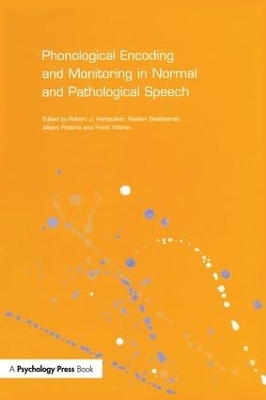
Phonological Encoding and Monitoring in Normal and Pathological Speech
Psychology Press Ltd (Verlag)
978-1-138-87744-3 (ISBN)
This book reports recent research on mechanisms of normal formulation and control in speaking and in language disorders such as stuttering, aphasia and verbal dyspraxia. The theoretical claim is that such disorders result both from deficits in a component of the language production system and interactions between this component and the system that 'monitors' for errors and undertakes a corrective behaviour. In particular, the book focuses on phonological encoding in speech (the construction of a phonetic plan for utterances), on verbal self-monitoring (checking for correctness and initiating corrective action if necessary), and on interactions between these processes.
Bringing together sixteen original chapters by leading international researchers, this volume represents a coherent statement of current thinking in this exciting field. The aim is to show how psycholinguistic models of normal speech processing can be applied to the study of impaired speech production. This book will prove invaluable to any researcher, student or speech therapist looking to bridge the gap between the latest advances in theory and the implications of these advances for language and speech pathology.
Robert J. Hartsuiker, Roelien Bastiaanse, Albert Postma, Frank Wijnen
R. Hartsuiker, R. Bastiaanse, A. Postma, F. Wijnen, Phonological Encoding and Monitoring in Normal and Pathological Speech. Section 1: Theories and Models of Phonological Encoding. G. Dell, A. Kim, Speech Errors and Word Form Encoding. A. Roelofs, Spoken Word Planning, Comprehending, and Self-monitoring: Evaluation of WEAVER++. Section 2: Pathologies of Phonological Encoding. N. Martin, An Interactive Activation Account of Aphasic Speech Errors: Converging Influences of Locus, Type and Severity of Processing Impairment. D.B. den Ouden, R. Bastiaanse, Phonological Encoding and Conduction Aphasia. K. Melnick, E. Conture, R. Ohde, Phonological Encoding in Young Children who Stutter. C. Code, Syllables in the Brain: Evidence from Brain Damage. L. Nijland, B. Maassen, Syllable Planning and Motor Programming Deficits in Developmental Apraxia of Speech. Section 3: Theories and Models of Self-monitoring. A. Postma, C. Oomen, Critical Issues in Speech Monitoring. S. Nooteboom, Listening to Oneself: Monitoring Speech Production. R. Hartsuiker, H. Kolk, H. Martensen, The Division of Labor between Internal and External Speech Monitoring. Section 4: Self-monitoring in Pathological Speech. C. Oomen, A. Postma, H. Kolk, Speech Monitoring in Aphasia: Error Detection and Repair Behavior in a Patient with Broca's Aphasia. N. Vasic, F. Wijnen, Stuttering as a Monitoring Deficit. M. Russell, M. Corley, R. Lickley, Magnitude Estimation of Disfluency by Stutterers and Non-stutterers. R. Hartsuiker, H. Kolk, R. Lickley, Stuttering on Function Words and Content Words: A Computational Test of the Covert Repair Hypothesis. Section 5: Conclusions and Prospects. F. Wijnen, H. Kolk, Phonological Encoding, Monitoring, and Language Pathology: Conclusions and Prospects.
| Verlagsort | Hove |
|---|---|
| Sprache | englisch |
| Maße | 156 x 234 mm |
| Gewicht | 498 g |
| Themenwelt | Geisteswissenschaften ► Psychologie ► Allgemeine Psychologie |
| Geisteswissenschaften ► Psychologie ► Biopsychologie / Neurowissenschaften | |
| Geisteswissenschaften ► Psychologie ► Verhaltenstherapie | |
| Geisteswissenschaften ► Sprach- / Literaturwissenschaft ► Sprachwissenschaft | |
| Medizin / Pharmazie ► Gesundheitsfachberufe ► Logopädie | |
| ISBN-10 | 1-138-87744-1 / 1138877441 |
| ISBN-13 | 978-1-138-87744-3 / 9781138877443 |
| Zustand | Neuware |
| Informationen gemäß Produktsicherheitsverordnung (GPSR) | |
| Haben Sie eine Frage zum Produkt? |
aus dem Bereich


